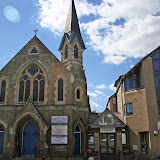During a recent dinner, a long-time member of Trinity Road Chapel handed me a stack of old hardbound copies of the church’s magazine The Witness. They’ve given me a wonderful introduction to the church. Within their pages, I’ve discovered Spurgeon (C.H. and sons), Graham Scroggie, F.B. Meyer, C.T. Studd, J. Frank Norris, T.T. Shields, Earnest Kevan, and D. Martyn Lloyd-Jones all preached here. Of particular interest is the influence C.H. Spurgeon and his family had on Trinity Road Chapel.
William Winsford, a member of the Metropolitan Tabernacle, moved to then rural Upper Tooting and soon met a few others with a desire to see an evangelical church established there. Three Sundays after services begun, C.H. Spurgeon invited Winsford to his nearby home, relayed his approval of the work, and generously offered to help. His engaged involvement in the early days of TRC set the trajectory of the church—an influence that lasts to this day.
When it was clear the growing church needed larger accommodations, Spurgeon came and preached, and issued an appeal to other churches to provide financial help for the church’s building project. His interest in TRC is clear when he wrote, “Our friends have made a good beginning, and if my purse holds out I will double all they can raise in the next year up to £250..I wish the friends every success." The money was soon raised, Spurgeon kept his promise, donated the £250, and offered to preach at the stone-laying.
The preacher Winsford purchased the property but soon fell ill and couldn’t conduct the services. Spurgeon heard of the church’s need, surveyed the property, and encouraged the church to get on with building the chapel. On June 6, 1877, Spurgeon laid the memorial stone and gave what was described as “a wise and happy address.” That evening, his sons joined him. The elder son, Charles, led in prayer and the younger, Thomas, delivered an address.
On Thursday, September 27, 1877, the new building opened with Spurgeon preaching from Eccl. 8:4 “Where the word of the king is.” The sermon is found in volume 28 of The Metropolitan Tabernacle Pulpit (sermon 1,697). He closed with this charge, “Preach the King’s word, for it will give you power in private prayer, power in the Sunday School, power in the prayer meeting, power in everything that you do; because you will live upon the King’s own word, and his word is meat to the soul.”
Spurgeon’s mark on TRC continued long after his death. One pastor had been a student at his pastor’s college and another, Henry Oakley, had supported Spurgeon through the Downgrade Controversy.
Oakley served TRC in its longest pastorate—a ministry of nearly fifty years. He influenced the church significantly and with the help of the deacons, steered it safely through doctrinal storms and around rocks of error that shipwrecked many other churches.
Oakley’s mark on the church came primarily through two means—his preaching and his writing. He maintained Spurgeon as his model for biblical, Christ-centered preaching and saw the Lord bless the preached Word with many conversions.
His writing ministry in the church’s magazine The Witness continues to hold a wide influence. Two authors, Iain Murray in The Forgotten Spurgeon and John MacArthur, in his Ashamed of the Gospel, quote a May 1934 article of The Witness that Oakley wrote as a part of a special celebration to commemorate the 100th year since Spurgeon’s birth.
In the 1940s, Earnest Kevan kept the church closely in line with its past by writing an article on the church’s faith and practice as set out in its trust deeds. Explaining that document, Kevan wrote, “The accurate interpretation of these requirements with regard to the life of the Church and the character of its ministry seems to be summed up by saying that as a Baptist Church, it is required that the minister who is called shall be a convinced Baptist, and that his views shall be Calvinistic, or, rendered in more modern terms, along the lines of teaching such as we have come to associate with the name of Charles Haddon Spurgeon.”
C.H Spurgeon’s son, Charles, frequently attended TRC after retiring from full-time ministry. In a January 1927 issue of The Witness, Henry Oakley mentioned the passing of son Charles Spurgeon and said this of him, “it has been one of the assurances of my later years that he could come and come again to our services, and to know that he felt there was ‘the right atmosphere,’ as he put it, at Trinity Road.”
I am fully committed to ensuring the right atmosphere continues at TRC. And a quote of Spurgeon in an article of The Witness, another place Oakley kept Spurgeon’s influence alive at TRC, best summarizes what that atmosphere is, “As the hammer comes down on the anvil ever with the same ring, so we will preach Christ, Christ, Christ and nothing else but Christ.” May God empower me to do just that!
15 September 2006
Subscribe to:
Posts (Atom)





